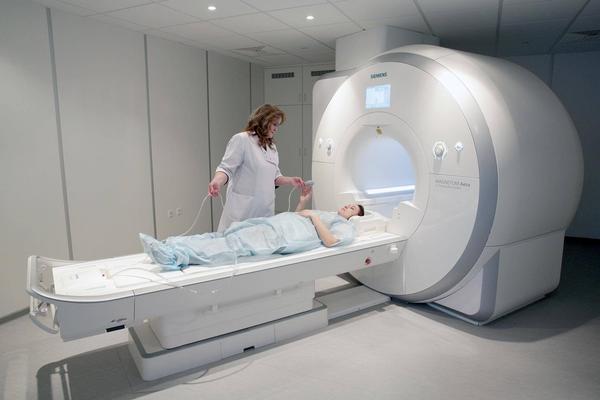Healthcare with Confidence
CT scanner is used by Israeli doctors to diagnose or control invasive procedures for diseases that cannot be detected by X-ray. To improve the quality of visualization of soft tissues, blood vessels and hollow organs, a contrast agent (dye – barium or iodine) can be used, which is injected into the blood.
The need for such a test will be determined at the doctor consultation in Israel.
CT (computed tomography or computed axial tomography) is a non-invasive type of X-ray that gives a three-dimensional image of internal organs. When performing this test, X-rays pass through the human body at different angles. The sensors detect the rays passing through the body and transmit electronic signals to the computer. That, in turn, processes the data and generates a three-dimensional visualization of the body.
CT scan of brain
The widespread use of computed tomography of the brain is a tool for the diagnosis of stroke, brain tumor, intracranial calcium accumulation, cerebral hemorrhage and skull fractures. In these situations, dark structures in images can indicate edema and stroke, while lighter structures can indicate calcium build-up, bleeding, and skull damage.
CT of lungs
Computed tomography can be used by Israeli doctors as a tool to diagnose chronic changes and painful processes in the lung tissue. CT has an advantage over X-ray diagnostics of lung diseases such as chronic obstructive pulmonary disease, fibrosis and related diseases. These tests, which produce thin slices of images of the lungs, are sometimes done twice, on inhalation and exhalation. CT angiography is also effective for the diagnosis of pulmonary embolism, in combination with the introduction of a contrast agent into the body, which allows to assess pulmonary arteries.
CT scan of abdomen and pelvis
Computed tomography is a sensitive diagnostic tool for detecting abdominal diseases. Sometimes this tool is used y Israeli doctors to determine the stage of a tumor. Computed tomography is used to clarify acute abdominal pain (especially in the lower two abdominal quadrants, while ultrasound is the primary instrument for clarifying upper right abdominal pain). Kidney stones, appendicitis, pancreatitis, diverticulitis, aortic aneurysm, and bowel obstruction are all diagnosed with computed tomography. Computed tomography is the preferred tool for diagnosing pelvic bones after injury.
CT scan of extremities
Computed tomography is a diagnostic tool for the identification and assessment of complex fractures of the limbs and joints, as it allows the formation of a three-dimensional image of the affected area at different levels. Tendon fractures and injuries are clearly visible on tomography images.
We follow instructions of the leading Israeli doctors, providing prompt coordination of CT diagnostics in one of the biggest hospitals mentioned by the doctor, transfer to the clinic, oral and written translations of the results.
Computed tomography is usually prescribed by a doctor in one of the Israeli hospitals, such as Assuta Medical Center, Ramat Aviv, Ichilov, Sheba, Beilinson.
CT results interpretation is done by an experienced Israeli radiologist, nuclear medicine specialist who has many years of experience in CT interpretation.
You can get a second opinion of a leading Israeli radiologist on the CT scan done in your country. Please contact us to clarify details.
Types of CT done in Israel
CT maxillofacial joint
CT face and nasal sinuses
CT abdominal enterography
CT scan knee
CT – calcification in the knee joint
Chest biopsy CT guided
Chest CT
CT radiosurgery
CT wrist
CT cardiac angiography
CTA – angiography
CT chest and mediastinum
CT thorax with a low dose
CT spine
CT angiography
Radiofrequency ablation of bone CT guided
Virtual colonoscopy
CT ankle
CT soft tissues
Abdominal CT
CT pelvis
CT brain
Biopsy CT guided



